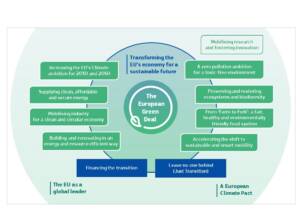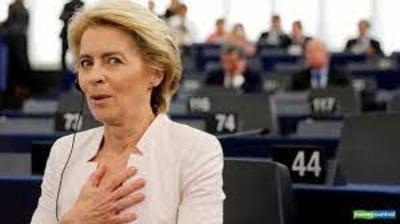In the past decade, Ursula von der Leyen, the President of the European Commission, has found herself at the center of growing criticism and opposition. While her proponents highlight achievements in areas such as the green transition and digitalization, a surge of discontent has emerged, fueled by concerns about her handling of critical issues. Let’s explore what led to the escalating anti-von der Leyen sentiment in Europe.
The initial point of contention lies in the dissatisfaction with the COVID-19 response. The European Union’s reaction to the pandemic faced widespread criticism for its perceived slowness and lack of coordination. Accusations surfaced regarding the Commission’s failure to secure sufficient medical supplies and indecisiveness in implementing crucial travel restrictions. The sluggish vaccine rollout in the early stages further fueled public discontent, leaving a lasting impact despite eventual improvement in vaccination rates.
Join us on Telegram: https://t.me/tfiglobal
Another key issue centers around the perceived mishandling of economic recovery. The economic aftermath of the pandemic hit European countries severely, with critics arguing that von der Leyen’s Commission has not done enough to support member states in their recovery efforts. Criticism also extended to the complex and bureaucratic nature of EU funding programs, making it challenging for businesses and individuals to access the financial assistance necessary for recovery.
Concerns about democratic accountability have further fueled the discontent. The European Commission, often seen as a distant and undemocratic institution, raised eyebrows with von der Leyen assuming the presidency without direct election by European citizens. Critics argue that the Commission’s unchecked power lacks sufficient democratic oversight, raising concerns about transparency and accountability.
Tensions with certain member states, particularly Hungary and Poland, have added to the challenges. Accusations of von der Leyen being too lenient on countries accused of violating EU values have surfaced. Simultaneously, some member states, including Italy and Spain, feel the EU has not provided adequate support during the pandemic and economic crisis, leading to a sense of neglect.

Read More: European Parliament Divided: Clashing Views on Ukraine Aid Unveiled!
Discontent with EU bureaucracy has compounded the issues. The EU, often criticized as a bureaucratic entity with complex rules and regulations, faced additional scrutiny under von der Leyen’s Commission. New initiatives and regulations were seen as contributing to an already burdensome bureaucratic structure, stifling businesses and individuals alike.
Not to mention, critics argue that Ursula von der Leyen has been ineffective in addressing the escalating immigration challenges in Europe, contributing to a surge in crime rates across the continent. Her administration has failed to implement robust measures to manage and mitigate the impact of increasing immigration, resulting in a strain on resources and heightened criminal activities.
These growing concerns are resonating among citizens and politicians across the continent, posing a significant challenge for von der Leyen. The upcoming European Parliament elections in 2024 are set to be a crucial test of her popularity and the overall trajectory of the European project. Whether von der Leyen can effectively address these concerns and restore public trust in the EU remains uncertain.
And it seems, Von der Leyen’s European Parliament majority is already on a knife-edge now.
The three parliamentary parties that back Von der Leyen may now only control 56% of the house, down from 60% during the current term due to an anticipated loss of five seats within her party.
Support for the European Commission In the European Parliament, President Ursula von der Leyen is currently in a precarious position as recent polls indicate that the upcoming elections for the Parliament would severely damage her already weak support base.
Three of her supporters will lose a lot of ground in the election, according to research by the European Council of Foreign Relations, with support going mostly to the right of the populist movement.
Read More: Europe’s Economic Hide-and-Seek with Russia and the Third-Party Gains
In the upcoming June election, researchers predict that the left-wing Progressive Alliance of Socialists and Democrats (S&D) group will gain 10 more legislators than it does now, while the Liberal Renew group will lose 16 seats.
The fragile alliance made up of the three factions in Parliament is predicted to constitute 56% of the house this term, down from 60% due to the anticipated loss of five members within Von der Leyen’s own European People’s Party.
In contrast, it is anticipated that both of the populist parties in Parliament would gain additional seats; in September, 18 more members of the European Conservative and Reformist groupings will be elected.
“The findings of our new study indicate that the composition of the European Parliament will shift markedly to the Right at this year’s elections,” said report co-author Dr Kevin Cunningham.
He continued by saying that the future European Commission will probably find it more challenging to implement its progressive agenda, which includes the European Green Deal.

The likelihood of such an anticipated change in political affiliation could potentially complicate Von der Leyen’s path to reappointment.
Although she hasn’t declared that she wants to run for office again this year, most analysts believe she will attempt to hold onto the top position.
That would need the consent of the newly elected European Parliament, which could become increasingly challenging as support for the German lawmaker wanes.
2019 saw a narrow victory for von der Leyen, who needed the support of the EPP, S&D group, and Renew in order to be appointed.
She also received less support than she had anticipated due to some potential last-minute S&D defections during the secret ballot. She was perceived as having received just nine votes more than the 374 required for election by neutral forces in the Parliament.
Read More: Germany’s Financial Struggle: Urgent Call for European Support
If such defections happen once more, they will probably cost Von der Leyen’s coalition even more in 2024 since it would be more difficult for it to run with 31 fewer seats.
An alternative option is that Right-wing parties and the EPP group establish an absolute majority alliance.
Even though such an alliance would probably be technically possible later this year, analysts have already projected that the EPP will not collaborate with hard-right figures.
Clearly, Ursula is losing support, and the shift could lean towards the Right, making her reappointment tricky. The win she got in 2019 might not happen again, and saying goodbye to leading the EU seems very well on the horizon.








